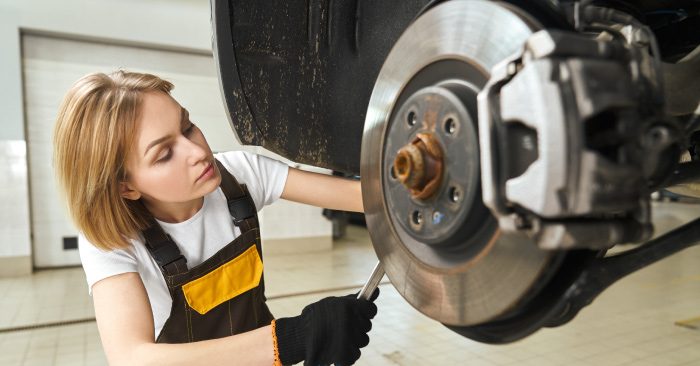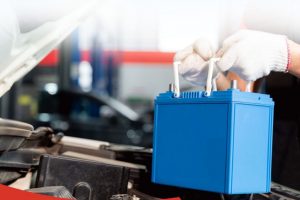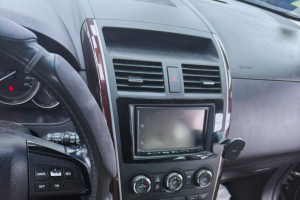Why wait to act till the last bell goes off and you find yourself in deep soup, or precisely, on any road with a faulty brake system! The most common mistake people tend to carry is the minimal attention paid to the state of affairs of their brakes. The car brakes fall in the crucial components category around their functional sensitivity.
Most vehicles today come with indicators attached to the braking unit that, with the help of screeching or clicking noises, notify the driver or passengers of a fault with the system. But in order to comprehend the sounds for the apprehension of a problem with the brakes, you must be aware of the surrounding. Keep your eyes and ears open at all times when you handle the behind-the-wheel operations, to know of a need for your car brakes replacement.
How to know if your car needs new brakes
Keep your senses open while you travel so that any glitch or an indication of a glitch is well caught in time and attended correctly. The concentration here is what the signs or symptoms are, that will notify of problems with the brake unit of your car. Look out for all signs and symptoms that point towards the need for new car brakes.
Following are the 8 common signs you need to look out for:
-
Persistent Screeching Sound
-
Squeaky Noise
-
Dense Grinding Noise
-
Pulsations or Vibrations
-
Visible Damage
-
Driveway Fluid Pool
-
One Side Pulling
-
Unusual Brake Responses
A screeching noise doesn’t mean the end of the world for you. The small metal shim called the indicator functions to provide audible warnings for any possible wear and tears. The sound could be a result of a help call for brake pad replacement needs. With excessive heating that might lead to the burning of the metal, the rotors can be glazed (due to repeated hard, rapid ‘braking’ from speed) or develop dark rings around. These signs call for a service check.
A hitch-pitched or noisy screech doesn’t always mean damaged brake pads. If the noise continues with the new pads too, other sources can be investigated. It could instead be a hint to look for the condition of your rotors. Sometimes the noise can come from the brake pads rubbing against rust (caused due to rains or water accumulation) developed on the rotors, which eventually fades with consecutive uses. But if the squeaking sound persists, it is best advised to schedule a brake service check for your car.
When you miss the screeching noises of all types, this comes as the last stage of warning before the rotors give off completely due to their continuous rubbing against the metal plates and the eventual brake failure. The heavy growling or grinding noise comes from the metal pieces of the disc and the calliper, rubbing together. This act can damage the rotors, might cause the brakes to stick, a stage where if delayed, a brake pad replacement won’t work, leading to their inevitable malfunction. It is highly advised that you don’t drive yourself to this cliffhanger point with failed car brakes.
At instances with a problem in your car’s braking unit, you might feel vibration or pulsations through the brake pedal. Vibrations usually result from your vehicle’s misalignment or warped rotors.
You can have a quick visual inspection of the brake pads thickness by a view through the spokes of your car wheel. Any amount of thickness less than a quarter-inch indicates a need for the brake pad replacement.
Brake fluid leak might also develop a puddle while your car is parked. If the case appears so, seek professional expertise for the problem diagnosis and rectification.
A brake fluid problem, like a foreign particle’s presence, or uneven wearing of the brake linings could result in the car pulling to a side every time you press the car brakes.
Always watch out for the responsiveness of your brakes. A degrading brake function will send out indications in the form of slowly responsive actions; like when your car takes a few seconds more than usual to brake (even after pressing the brake pedal), it could mean an expiring brake pad. A fluid leak could also be a reason for the slow responsive brake, and in such cases, schedule a brake service to avoid mishaps.
A sudden jerk on pressing the brake could also be an indication of the need for a brake fluid change or uneven wear down of the rotors.
Insensitive braking is another response that indicates any defect in the brake, like thin brake pads, the air in the fluid, or a problem with the car’s hydraulic system.
The brakes form a very sensitive component of the car parts and the above-mentioned symptoms draw a clear picture of the complexity and work that is needed to first diagnose the cause of the defect (from the signs) and then rectify it. While you look for the best car service provider in the UAE, visit our website. Carcility is the complete one-stop destination for all your car repair, service, or maintenance needs. Select your nearest and most convenient service station and book an order to get instant, transparent quotes and a feature to live-track your service from anywhere on your device. Download our app, now!







